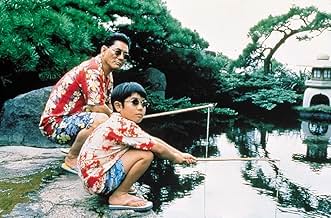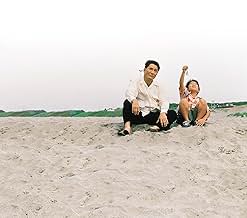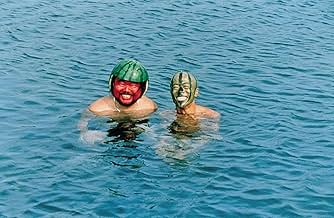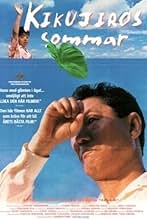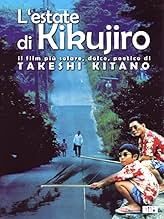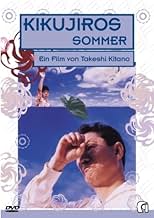NOTE IMDb
7,7/10
23 k
MA NOTE
Un jeune garçon naïf se lance seul à la recherche de sa mère égarée. Bientôt, il rencontre en la personne d'un homme maussade un protecteur improbable et ils vivent tous deux une série d'ave... Tout lireUn jeune garçon naïf se lance seul à la recherche de sa mère égarée. Bientôt, il rencontre en la personne d'un homme maussade un protecteur improbable et ils vivent tous deux une série d'aventures inattendues en cours de route.Un jeune garçon naïf se lance seul à la recherche de sa mère égarée. Bientôt, il rencontre en la personne d'un homme maussade un protecteur improbable et ils vivent tous deux une série d'aventures inattendues en cours de route.
- Réalisation
- Scénario
- Casting principal
- Récompenses
- 4 victoires et 4 nominations au total
Takeshi Kitano
- Kikujiro
- (as Beat Takeshi)
The Great Gidayû
- Biker
- (as Gurêto Gidayû)
Beat Kiyoshi
- Man at Bus Stop
- (as Bîto Kiyoshi)
Yôji Tanaka
- Yakuza Henchman
- (as Yoji Tanaka)
Avis à la une
It is summertime, and Masao is a lonely boy living with his grandmother in Tokyo. One day, he finds an address supposedly belonging to his long-lost mother, and decides to try and find her. His grandmother's friend insists that her husband, Kikujiro, accompany Masao, and the two set out together; despite not knowing each other well. On their long journey, Kikujiro and Masao engage in many adventures, meeting colourful characters along the way and forging a bond stronger than that between parent and child. Whether or not their friendship withstands the test of time- and if they find Masao's mother- remains to be seen in the dramatic powerhouse that is Takeshi Kitano's 'Kikujiro.'
Kitano's eighth feature film, 'Kikujiro' is a delightfully funny and poignant road movie sure to warm the cockles of any viewers' heart. A simple story about friendship and connection, the trip Masao and Kikujiro undertake contains subtle power and emotional depth, whilst also being frequently hilarious. The characters are all well-drawn and the escapades they engage in both wildly entertaining and affecting. The relationship that develops between Masao and Kikujiro is realistic and heart-warming, and the film's exploration of those considered 'outsiders' is one most intelligent and subdued. Much like Kitano's previous 'A Scene At The Sea,' the film's power is of the low-key and naturalistic variety; and 'Kikujiro' will surely linger in the mind long after the credits have rolled.
'Kikujiro' reunites Kitano with cinematographer Katsumi Yanagishima, for their sixth out of sixteen collaborations. Yanagishima's muted work is undeniably powerful and beguiling, lending the film and its' story additional beauty and depth. His is not pretentious or needlessly hectic cinematography, it is steady and sure work that produces sagacious, artful and distinct results. That Kitano has utilised Yanagishima's immeasurable talents for every one of his movies bar 'Violent Cop' and 'Hana-Bi' proves just how effectively the two men work together; and the visuals borne of their partnership for 'Kikujiro' are unforgettable.
The same can be said of another frequent collaborator of Kitano's, composer Joe Hisaishi: his score for 'Kikujiro' is catchy and evocative. The fifth film of Kitano's Hisaishi has worked on, his melodies are haunting and delicate. The theme, 'Summer,' is particularly beautiful, and like an earwig worms it's way into one's subconscious, establishing itself as a tune one will find it most difficult to forget. Hisaishi frequently plays the 'Kikujiro' soundtrack while touring, and the enduring popularity of the music shows just how moving and ineffaceable it is.
'Kikujiro' also boasts highly detailed costume design from Fumio Iwasaki that lends additional dimension to characters, as well as echoing past works from Kitano's cinematic canon (most notably through the short sleeved Hawaiian shirts featured so prominently in 'Sonatine'). Also of note is Ryôji Kasumi and Michio Miyauchi's work in the makeup department and Tatsuo Ozeki's rich set decoration; which adds further believability to the proceedings.
'Kikujiro' stars Kitano in the titular role and Yusuke Sekiguchi as Masao, making his big screen debut. Sekiguchi is a fine actor who remains understated throughout, crafting in Masao a character both believable and compelling. It could be argued that he has the least to do in the cast- certainly he has relatively little dialogue or any large displays of emotion- and that many other young boys could have played the role as effectively. However, that is to do a serious discredit to the subtlety of his acting. Though he only has one other film role to date, Sekiguchi has left an indelible imprint on cinema through his brilliant performance as Masao.
Kitano is terrific as Kikujiro, making him a slightly unhinged comedic force of nature, as well as a profoundly complex man. His relationship with Masao forces him to examine his own life, which he finds wanting; and Kitano's performance is powerfully understated and wildly entertaining. It is assumed that Kikujiro is a facsimile of Kitano's own father, and the fondness and exuberance with which he approaches the role betrays a great respect, admiration and love for the man. Kitano's Kikujiro may be one of his finest performances from his storied career; and is certainly his warmest and most heartfelt.
The supporting cast is populated with talented actors like Kayoko Kishimoto and Akaji Maro, both of whom steal their too few scenes as Kikujiro's wife and a seedy fellow Masao encounters in a park, respectively. All the secondary performers do admirable work, with Nezumi Imamura, Gurêto Gidayû and Rakkyo Ide impressing and entertaining the most as a travelling writer and two bikers Masao and Kikujiro befriend along the way. From the smallest role to the titular one; everyone in the film is perfectly cast.
'Kikujiro' is a powerful, funny and genuinely moving film from Takeshi Kitano that impresses on every level. Strongly acted, well-written and featuring stunning cinematography from Katsumi Yanagishima; the movie is entertaining and memorable both. With an atmospheric Joe Hisaishi score and detailed costume and set design; there is little to fault with the film. In short, 'Kikujiro' is a bittersweet symphony of unaffected profundity and voluminous emotional depth that hits all the right notes.
Kitano's eighth feature film, 'Kikujiro' is a delightfully funny and poignant road movie sure to warm the cockles of any viewers' heart. A simple story about friendship and connection, the trip Masao and Kikujiro undertake contains subtle power and emotional depth, whilst also being frequently hilarious. The characters are all well-drawn and the escapades they engage in both wildly entertaining and affecting. The relationship that develops between Masao and Kikujiro is realistic and heart-warming, and the film's exploration of those considered 'outsiders' is one most intelligent and subdued. Much like Kitano's previous 'A Scene At The Sea,' the film's power is of the low-key and naturalistic variety; and 'Kikujiro' will surely linger in the mind long after the credits have rolled.
'Kikujiro' reunites Kitano with cinematographer Katsumi Yanagishima, for their sixth out of sixteen collaborations. Yanagishima's muted work is undeniably powerful and beguiling, lending the film and its' story additional beauty and depth. His is not pretentious or needlessly hectic cinematography, it is steady and sure work that produces sagacious, artful and distinct results. That Kitano has utilised Yanagishima's immeasurable talents for every one of his movies bar 'Violent Cop' and 'Hana-Bi' proves just how effectively the two men work together; and the visuals borne of their partnership for 'Kikujiro' are unforgettable.
The same can be said of another frequent collaborator of Kitano's, composer Joe Hisaishi: his score for 'Kikujiro' is catchy and evocative. The fifth film of Kitano's Hisaishi has worked on, his melodies are haunting and delicate. The theme, 'Summer,' is particularly beautiful, and like an earwig worms it's way into one's subconscious, establishing itself as a tune one will find it most difficult to forget. Hisaishi frequently plays the 'Kikujiro' soundtrack while touring, and the enduring popularity of the music shows just how moving and ineffaceable it is.
'Kikujiro' also boasts highly detailed costume design from Fumio Iwasaki that lends additional dimension to characters, as well as echoing past works from Kitano's cinematic canon (most notably through the short sleeved Hawaiian shirts featured so prominently in 'Sonatine'). Also of note is Ryôji Kasumi and Michio Miyauchi's work in the makeup department and Tatsuo Ozeki's rich set decoration; which adds further believability to the proceedings.
'Kikujiro' stars Kitano in the titular role and Yusuke Sekiguchi as Masao, making his big screen debut. Sekiguchi is a fine actor who remains understated throughout, crafting in Masao a character both believable and compelling. It could be argued that he has the least to do in the cast- certainly he has relatively little dialogue or any large displays of emotion- and that many other young boys could have played the role as effectively. However, that is to do a serious discredit to the subtlety of his acting. Though he only has one other film role to date, Sekiguchi has left an indelible imprint on cinema through his brilliant performance as Masao.
Kitano is terrific as Kikujiro, making him a slightly unhinged comedic force of nature, as well as a profoundly complex man. His relationship with Masao forces him to examine his own life, which he finds wanting; and Kitano's performance is powerfully understated and wildly entertaining. It is assumed that Kikujiro is a facsimile of Kitano's own father, and the fondness and exuberance with which he approaches the role betrays a great respect, admiration and love for the man. Kitano's Kikujiro may be one of his finest performances from his storied career; and is certainly his warmest and most heartfelt.
The supporting cast is populated with talented actors like Kayoko Kishimoto and Akaji Maro, both of whom steal their too few scenes as Kikujiro's wife and a seedy fellow Masao encounters in a park, respectively. All the secondary performers do admirable work, with Nezumi Imamura, Gurêto Gidayû and Rakkyo Ide impressing and entertaining the most as a travelling writer and two bikers Masao and Kikujiro befriend along the way. From the smallest role to the titular one; everyone in the film is perfectly cast.
'Kikujiro' is a powerful, funny and genuinely moving film from Takeshi Kitano that impresses on every level. Strongly acted, well-written and featuring stunning cinematography from Katsumi Yanagishima; the movie is entertaining and memorable both. With an atmospheric Joe Hisaishi score and detailed costume and set design; there is little to fault with the film. In short, 'Kikujiro' is a bittersweet symphony of unaffected profundity and voluminous emotional depth that hits all the right notes.
By 1999 Takeshi Kitano had quite rightly gained a lot of international recognition for his brilliantly constructed Yakuza/Cop stories, but was apparently dis-satisfied that everybody tended to focus on the violence in them. So he decided to make a movie without any violence to remind people that he was a much more rounded talent than that. "Are you sure about this?", the world asked. "Yes", he replied... and made Kikujiro.
Kikujiro is difficult to adequately describe, but the fact that it was allegedly inspired by the Wizard of Oz is a good starting point. The basic premise is a road trip, where Kitano is the unlikely chaperone for a little boy who wants to go and find his mother. After gambling away all the money his wife gives him to take the kid, they have to improvise their transport across the country. Along the way they meet a small but colourful cast of characters, and get to know each other a little bit too.
I'd hesitated about picking this up for ages, and eventually went for a rental rather than a purchase. Kitano minus violence just didn't seem right! But that was definitely an injustice I was doing him, and Kikujiro is a good demonstration that his talents really are much broader. In fact, after watching it there is no doubt that he is one of the greatest director/actor/writer and editor working in the world today. A brilliantly painted story, full of subtly and quirkiness. Awesome cinematography and an incredible soundtrack... truly world class in every respect. Well, to be fair the child actor was a bit stiff, but it seems mean to hold that against the movie.
Definitely recommended if you haven't already seen it!
Kikujiro is difficult to adequately describe, but the fact that it was allegedly inspired by the Wizard of Oz is a good starting point. The basic premise is a road trip, where Kitano is the unlikely chaperone for a little boy who wants to go and find his mother. After gambling away all the money his wife gives him to take the kid, they have to improvise their transport across the country. Along the way they meet a small but colourful cast of characters, and get to know each other a little bit too.
I'd hesitated about picking this up for ages, and eventually went for a rental rather than a purchase. Kitano minus violence just didn't seem right! But that was definitely an injustice I was doing him, and Kikujiro is a good demonstration that his talents really are much broader. In fact, after watching it there is no doubt that he is one of the greatest director/actor/writer and editor working in the world today. A brilliantly painted story, full of subtly and quirkiness. Awesome cinematography and an incredible soundtrack... truly world class in every respect. Well, to be fair the child actor was a bit stiff, but it seems mean to hold that against the movie.
Definitely recommended if you haven't already seen it!
In the title role of this highly original 1999 road movie, Beat Takeshi - with his twitching eye and bow-legged shuffle - looks and acts like a cross between Mickey Rourke and Harvey Keitel with a heavy dose of Walter Matthau's sourpuss demeanor (circa "The Bad News Bears") for good measure. He creates a truly memorable character - cynically profane, unapologetically insulting, childishly manipulative and somehow likable. As the director and screenwriter of said film, Takeshi Kitano - the same guy - has fashioned something quite unique from a tired premise - a boy's search for his mother and the gruff man who begrudgingly helps find her. What could have been a predictable and sentimental wallow, especially with the indiscriminate use of angels as a pervasive symbol, is instead an idiosyncratic, emotionally adroit film that sometimes simmers on the cusp of violence.
Yet it becomes ultimately affecting almost in spite of itself. In fact, Kitano does such a resolutely offbeat job that at certain times, the film reminds me of the narrative ellipses and low steady shots that were the trademark of Yasujiro Ozu's home dramas, intermingled with a surprisingly intense Quentin Tarantino-like, in-your-face edginess. The protagonist of the film is really the latch-key nine-year old, Masao, who is on a quest to find the mother whom his grandmother says is "away working". With his sad eyes and cherubic face, Yusuke Sekiguchi is perfectly cast as Masao providing the moral compass for the story. Whether he is running with his arms flailing or forlornly playing soccer by himself, he is poignant without being saccharine and completely natural. It is Masao's scrapbook that provides the framework for the film lending each chapter a descriptive title. Every chapter has a distinct character that is, in various turns, playful, hilarious, disturbing, surreal and heartbreaking. Case in point: Kitano is not afraid to use a child molester as first an uncomfortable source of black humor and then as the subject of Masao's nightmare. My favorite scenes come toward the end when Kikujiro organizes a motley crew of misfits to play games with Masao and have them masquerade as Indians, aliens, marine life and even watermelons. The variety in tone between chapters makes for unexpected tonal shifts, but somehow it works and adds to the greater context of the story.
That Kitano is able to manage a consistent film-making style with a strong visual sense is a credit to the talent behind the camera - not only Kitano's direction, script and film editing but also his artwork showcased throughout the movie, Katsumi Yanagishima's sharply rendered cinematography and Joe Hisaishi's evocative Windham Hill-like score. There are some funny sideline performances from Gidayu Great and Rakkyo Ide as Fatso and Baldy, two bikers who turn out to be the Abbott and Costello of soft-hearted slackers; Nezumi Mamura as a free-spirited drifter; Fumie Hosokawa as a relentlessly perky girl with a talent for juggling; and in the opening sequence, Kayoko Kishimoto as Kikujiro's take-no-prisoners wife. Kitano, however, elicits the most laughs if only for the film's central conceit that he gets away with his infantile gangster behavior. One would think the story would climax when Masao comes upon his mother, but Kitano confounds expectations with every new scene. The DVD really has no extras other than a couple of trailers not related to the film (not coincidentally, one is for Walter Salles' "Central Station" which has a similar story structure). I know this film has its detractors, especially among fans of Kitano's bloodier work, but I find it intriguingly ambiguous and thoroughly enjoyable.
Yet it becomes ultimately affecting almost in spite of itself. In fact, Kitano does such a resolutely offbeat job that at certain times, the film reminds me of the narrative ellipses and low steady shots that were the trademark of Yasujiro Ozu's home dramas, intermingled with a surprisingly intense Quentin Tarantino-like, in-your-face edginess. The protagonist of the film is really the latch-key nine-year old, Masao, who is on a quest to find the mother whom his grandmother says is "away working". With his sad eyes and cherubic face, Yusuke Sekiguchi is perfectly cast as Masao providing the moral compass for the story. Whether he is running with his arms flailing or forlornly playing soccer by himself, he is poignant without being saccharine and completely natural. It is Masao's scrapbook that provides the framework for the film lending each chapter a descriptive title. Every chapter has a distinct character that is, in various turns, playful, hilarious, disturbing, surreal and heartbreaking. Case in point: Kitano is not afraid to use a child molester as first an uncomfortable source of black humor and then as the subject of Masao's nightmare. My favorite scenes come toward the end when Kikujiro organizes a motley crew of misfits to play games with Masao and have them masquerade as Indians, aliens, marine life and even watermelons. The variety in tone between chapters makes for unexpected tonal shifts, but somehow it works and adds to the greater context of the story.
That Kitano is able to manage a consistent film-making style with a strong visual sense is a credit to the talent behind the camera - not only Kitano's direction, script and film editing but also his artwork showcased throughout the movie, Katsumi Yanagishima's sharply rendered cinematography and Joe Hisaishi's evocative Windham Hill-like score. There are some funny sideline performances from Gidayu Great and Rakkyo Ide as Fatso and Baldy, two bikers who turn out to be the Abbott and Costello of soft-hearted slackers; Nezumi Mamura as a free-spirited drifter; Fumie Hosokawa as a relentlessly perky girl with a talent for juggling; and in the opening sequence, Kayoko Kishimoto as Kikujiro's take-no-prisoners wife. Kitano, however, elicits the most laughs if only for the film's central conceit that he gets away with his infantile gangster behavior. One would think the story would climax when Masao comes upon his mother, but Kitano confounds expectations with every new scene. The DVD really has no extras other than a couple of trailers not related to the film (not coincidentally, one is for Walter Salles' "Central Station" which has a similar story structure). I know this film has its detractors, especially among fans of Kitano's bloodier work, but I find it intriguingly ambiguous and thoroughly enjoyable.
Vignettes of childhood memories - possibly Kitano's own childhood experiences and impressions, "Kikujiro" is not like the deep or layered deliveries Kitano has in "Fireworks" (Hana-bi) 1997, or "Sonatine" 1994. There are no cops or graphic depictions of violence. There are still some gangster-type characters, but the encounters are simple, requiring no synthesis. Kitano's familiar elements and locales are present: drawings, vignettes, seaside, temple, and angels.
It's really a loving portrayal of one little boy, Masao's, summer, spent with this seemingly eccentric retired gangster "Mister" played by Kitano. We have a pair of comic bikers, a lone van traveler, an arguing truck driver, a fun juggling couple, prankish hitchhiking gags, and a rather extensive betting session at the (bicycle) races. There are occasions for sentimental tears, for instance, when "Mister" took a side trip to visit his own mother; but play is the key operative here. Even though the child appears to be a sulky non-smiling little boy most of the time, a boy will be a boy when it comes to play and open up to lightness of the heart.
If you're the hurrying kind, this film may not be for you. The film is at its own flow and pace. It's Masao's summer vacation adventures, and he's not in a hurry to go home. Joe Hisaishi's theme music for "Kikujiro" certainly is catchy and the score gave Kitano's film its rhythm and accents along this unlikely pair's journey - a grown man, who's become childlike once more while escorting Masao on his quest to fulfill the dream of seeing his mother. Does it matter whether Masao sees his mother or not? He gains a friend, Kikujiro.
Kudos to Sony Pictures Classics for their film distribution selections! At the recent Bravo cable channel's IFC (Independent Film Channel) tenth Gotham Awards, Catherine Deneuve presented the Industry Lifetime Achievement Award to the trio: Tom Bernard, Marcie Bloom, Michael Barker. It was noted: "This award is being created specifically for this year's ceremony to honor the trio for their 20 years of service as champions of independent filmmakers." Besides the theme from Woody Allen's "Sweet and Lowdown", Joe Hisaishi's music from "Kikujiro" was mostly used during the montage of the film clips. Films the trio has co-produced include the popular 1999 Tom Tykwer's "Run Lola Run" (German), Pedro Almodovar's 1999 triumph "All About My Mother" (Spanish), the Brazilian gem in 1998 "Central Station", Hal Hartley's 1997 saga "Henry Fool", John Sayles' 1996 hit "Lone Star", the 1995 French surprise "The City of Lost Children", and as far back as 1971 Vittorio De Sica's "The Garden of the Finzi-Contini".
It's really a loving portrayal of one little boy, Masao's, summer, spent with this seemingly eccentric retired gangster "Mister" played by Kitano. We have a pair of comic bikers, a lone van traveler, an arguing truck driver, a fun juggling couple, prankish hitchhiking gags, and a rather extensive betting session at the (bicycle) races. There are occasions for sentimental tears, for instance, when "Mister" took a side trip to visit his own mother; but play is the key operative here. Even though the child appears to be a sulky non-smiling little boy most of the time, a boy will be a boy when it comes to play and open up to lightness of the heart.
If you're the hurrying kind, this film may not be for you. The film is at its own flow and pace. It's Masao's summer vacation adventures, and he's not in a hurry to go home. Joe Hisaishi's theme music for "Kikujiro" certainly is catchy and the score gave Kitano's film its rhythm and accents along this unlikely pair's journey - a grown man, who's become childlike once more while escorting Masao on his quest to fulfill the dream of seeing his mother. Does it matter whether Masao sees his mother or not? He gains a friend, Kikujiro.
Kudos to Sony Pictures Classics for their film distribution selections! At the recent Bravo cable channel's IFC (Independent Film Channel) tenth Gotham Awards, Catherine Deneuve presented the Industry Lifetime Achievement Award to the trio: Tom Bernard, Marcie Bloom, Michael Barker. It was noted: "This award is being created specifically for this year's ceremony to honor the trio for their 20 years of service as champions of independent filmmakers." Besides the theme from Woody Allen's "Sweet and Lowdown", Joe Hisaishi's music from "Kikujiro" was mostly used during the montage of the film clips. Films the trio has co-produced include the popular 1999 Tom Tykwer's "Run Lola Run" (German), Pedro Almodovar's 1999 triumph "All About My Mother" (Spanish), the Brazilian gem in 1998 "Central Station", Hal Hartley's 1997 saga "Henry Fool", John Sayles' 1996 hit "Lone Star", the 1995 French surprise "The City of Lost Children", and as far back as 1971 Vittorio De Sica's "The Garden of the Finzi-Contini".
Kikujiro is a movie with beautiful calmness that's a great diversity from the fast cut movies today. Takeshi Kitano proofs once and for all, that he's a master filmmaker that will forever be remembered. And even though he dislikes the fame that goes along with his more successful movies (Zatoichi), it's a shame he doesn't get more recognition for his films.
Kikujiro no natsu tells the story of a kid who decides to visit his mother that he never met. Through odd circumstances kikujiro (Kitano), though absolutely unqualified, is forced to lead the kid. But as we see only moments later the boy would be better off alone, as kikujiro's fondness of gambling and (very amusing) way to treat people makes the journey a funny and quite touching odyssee.
What stands out in this movie is the simple comedy. It shows Kitano started off as a comedian, and his dialogue and acting made me almost spill my milk more than a few times. This is certainly one of his best. A great film for a quiet, rainy sunday afternoon.
Kikujiro no natsu tells the story of a kid who decides to visit his mother that he never met. Through odd circumstances kikujiro (Kitano), though absolutely unqualified, is forced to lead the kid. But as we see only moments later the boy would be better off alone, as kikujiro's fondness of gambling and (very amusing) way to treat people makes the journey a funny and quite touching odyssee.
What stands out in this movie is the simple comedy. It shows Kitano started off as a comedian, and his dialogue and acting made me almost spill my milk more than a few times. This is certainly one of his best. A great film for a quiet, rainy sunday afternoon.
Le saviez-vous
- AnecdotesTakeshi Kitano made this gentler film as an antidote to his usual violent gangster movies.
- Crédits fousThere's one more scene after the credits.
- ConnexionsFeatured in Jam session - Kikujiro no natsu koshiki kaizokuban (1999)
- Bandes originalesSummer
Written by Joe Hisaishi
Meilleurs choix
Connectez-vous pour évaluer et suivre la liste de favoris afin de recevoir des recommandations personnalisées
- How long is Kikujiro?Alimenté par Alexa
Détails
- Date de sortie
- Pays d’origine
- Sites officiels
- Langue
- Aussi connu sous le nom de
- Kikujiro
- Lieux de tournage
- Sensoji Temple, Asakusa, Taito, Tokyo, Japon(Masao and his friend walk across the temple grounds)
- Sociétés de production
- Voir plus de crédits d'entreprise sur IMDbPro
Box-office
- Montant brut aux États-Unis et au Canada
- 200 920 $US
- Week-end de sortie aux États-Unis et au Canada
- 28 079 $US
- 28 mai 2000
- Montant brut mondial
- 281 527 $US
- Durée2 heures 2 minutes
- Couleur
- Mixage
- Rapport de forme
- 1.85 : 1
Contribuer à cette page
Suggérer une modification ou ajouter du contenu manquant

Lacune principale
By what name was L'été de Kikujiro (1999) officially released in Canada in French?
Répondre

